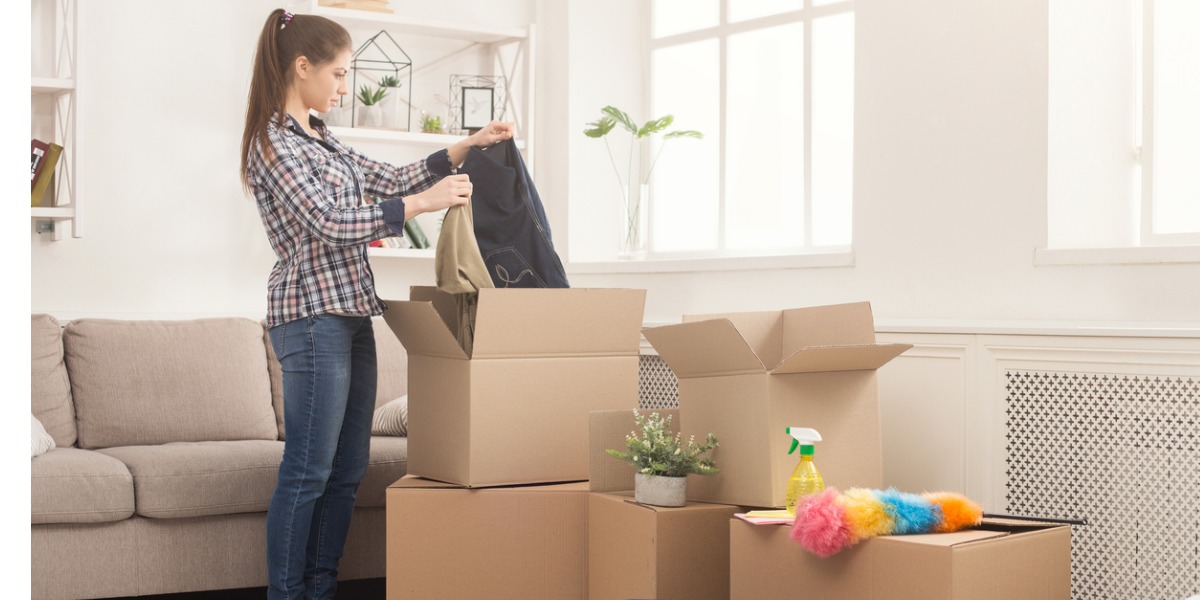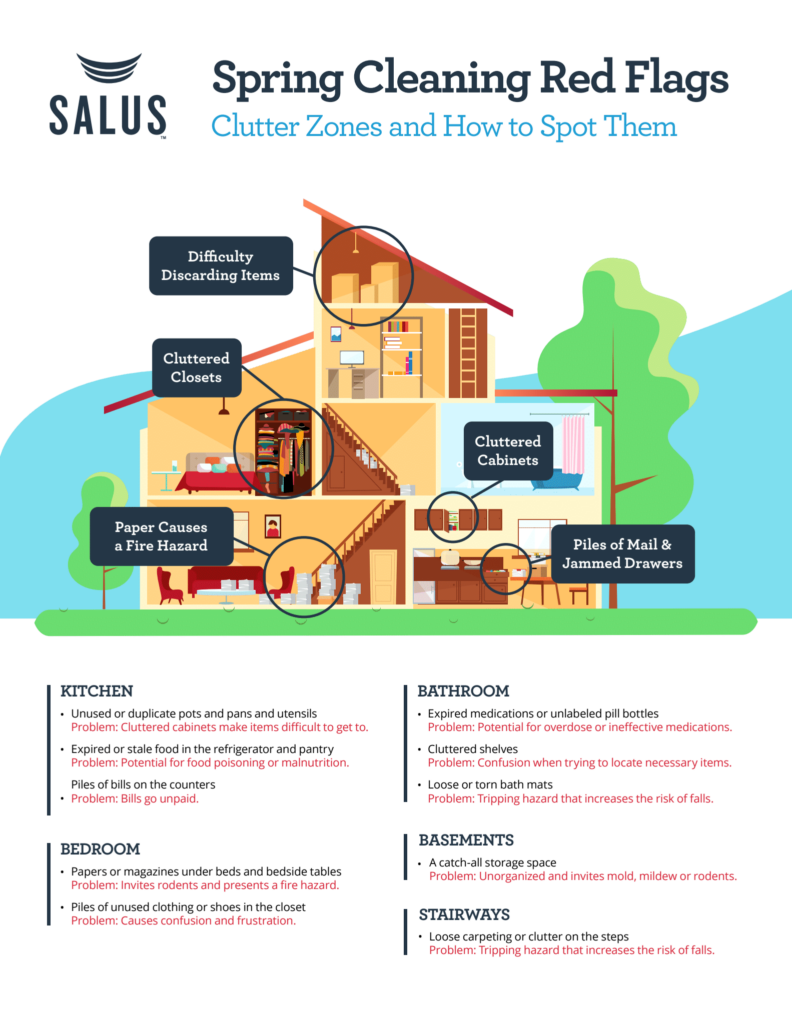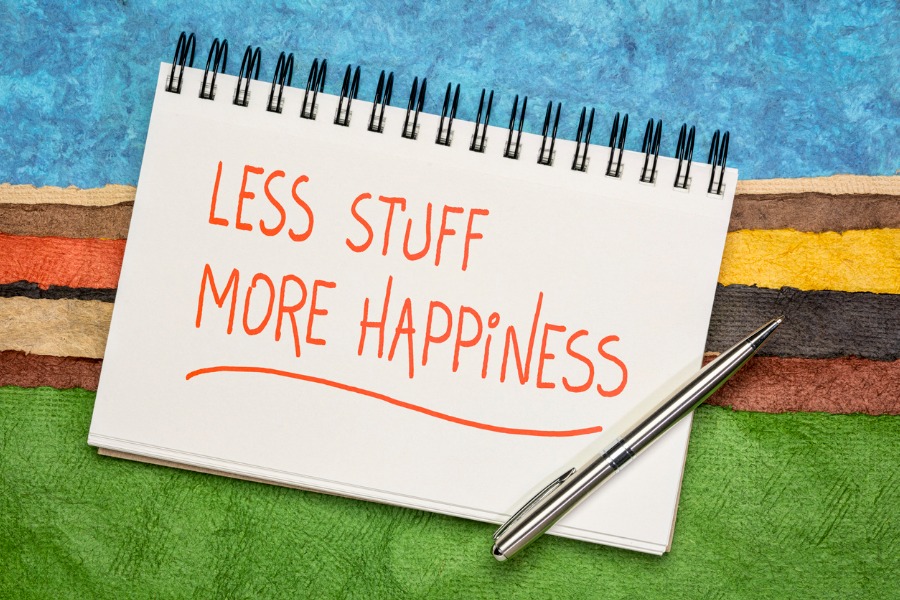
A visit to a senior loved one’s home reveals kitchen counters that are cluttered, expired food in the refrigerator, and an unorganized medicine cabinet. If this describes a recent trip to your aging parents home, know that you’re not alone. Difficulty with discarding or parting with possessions because of a perceived need to save them is a common occurrence among adults, and these habits sometimes get worse as a person ages.
An unorganized and cluttered home is not only unpleasant to live in, it also presents stress and safety hazards. Spring is the perfect time for removing clutter and making your aging loved one’s home a safer and stress free environment. Here are several easy spring cleaning for senior safety tips to get you started.

The Kitchen
Deep cleaning and organizing the kitchen benefits your aging loved one. It creates a space where important items are within reach, safety hazards are reduced, and food is fresh and within date.
- Begin this process by going drawer by drawer and cabinet by cabinet. Remove unnecessary or duplicate items to reduce clutter.
- Then, ask your senior loved one to walk through the kitchen with you. Ensure that the things they need are within reach.
- Relocate any frequently used items that they have to stretch high or stoop low to reach. This simple step reduces the risk of falls and helps to make cooking safer.
- If your aging parent shows signs of dementia, label drawers, cabinets, the spice rack, etc. to make finding the things they need easier.
- Next, remove all of the food from their refrigerator and pantry and wipe down all surfaces with a sanitizing bleach cleaner to reduce the risk of bacteria-born illnesses.
- As you’re putting the food back in place, review expiration dates. This makes it easier to throw out any expired or stale items.
- Toss any open and long unused flour, cereal or other dried items. This reduces the risk of insect infestation and creates a healthier home.
The Medicine Cabinet

The next task to check off your list is the medicine cabinet.
- Examine expiration dates for everything including ointments, vitamins, prescriptions and over the counter medications. Discard anything that is past the expiration date as these medications are often ineffective or even dangerous.
- If there’s no expiration date listed, follow the one-year cut off rule. After a year, prescription medications especially can pose safety hazards.
- Discard Unmarked containers or medications that are “off” in smell or color for safety.
- If your loved one uses a pill box, help organize it and ensure it’s easy to open and locate. For this task in particular, consider having a family member or a home caregiver remind your loved one to fill and organize their pill box at the beginning of every week.
Use caution when throwing away any contents from the medicine cabinet. Discarded the wrong way, medications can pose dangers to our water supply and environment. Throughout California, “Don’t Rush to Flush” bins offer a safe and simple way to dispose of unwanted medications. Find your nearest bin here.
Throughout the Home

As a final step, take some time to complete a brief safety assessment of the home.
- Look for tripping hazards like loose throw rugs or tangled cords, excessive clutter, or large or unnecessary pieces of furniture that are blocking walkways. Removing clutter and properly securing these items creates a safer home environment and reduces the risk of falls.
- Replace the batteries in smoke and carbon monoxide detectors as well as any burnt out or dim light bulbs.
- Place at least one fire extinguisher on every level of the home.
- Create a simple first aid kit. Also gather a flashlight, batteries, non-perishable foods and essential medications. Place these things in an easy to find location. Notify both the senior and any professional caregivers or family caregivers about the location of the kit.
Our spring cleaning tips can help you begin a great tradition. Spending time on these tasks creates a home that is more comfortable and safer too.
If the older adults in your life might benefit from a higher level of support, Salus Homecare is here to help. Contact us anytime with questions or to schedule a free assessment.

